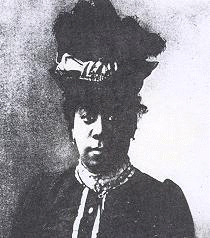-
|

|
6: Late Nineteenth Century
and Naturalism
Pauline
Elizabeth Hopkins
1859-1930
|
©
Paul P. Reuben
September 13, 2019
E-Mail
|
Page Links: |
Selected
Bibliography 1980-Present
| Study
Questions |
MLA Style
Citation of this Web Page
|

Primary Works
Contending
forces: a romance illustrative of Negro life North and South,
1900; Hagar's Daughter: A Story of Southern Class
Prejudice, 1902; Winona: A Tale of Negro Life in the South
and Southwest, 1902; Of One Blood, or, the Hidden Self,
1903; Founder & Editor, Colored American Magazine; her story,
"A Dash for Liberty," is an adaptation of the Creole
rebellion (the subect of Frederick Douglass' The Heroic
Slave whose protagonist in Madison Washington; Hopkins renames
the protagonist, Madison Monroe; for a discussion, see John
Grusser's article, listed below).
Contending forces: a
romance illustrative of Negro life North and South ( 1900).
NY: Oxford UP, 1988. PS1999 .H4226 C66
The magazine novels of
Pauline Hopkins. NY: Oxford UP, 1988. PS1999 .H4226 A6
Selected
Bibliography 1980-Present
Allen, Carol. Black Women
Intellectuals: Strategies of Nation, Family, and Neighborhood in the
Works of Pauline Hopkins, Jessie Fauset, and Marita Bonner. NY:
Garland, 1998.
Bergman, Jill. The
Motherless Child in the Novels of Pauline Hopkins. Baton Rouge:
Louisiana State UP, 2012.
Brown, Lois. Pauline
Elizabeth Hopkins: Black Daughter of the Revolution. Chapel Hill:
U of North Carolina P, 2008.
Campbell, Jane. Mythic
Black Fiction: The Transformation of History. Knoxville: U of
Tennessee P, 1986.
Carby, Hazel.
Recostructing Womanhood: The Emergence of the Afro-American Woman
Novelist. NY: Oxford UP, 1987.
Dworkin, Ira. ed.
Daughter of the Revolution: The Major Nonfiction Works of Pauline
E. Hopkins. New Brunswick, NJ: Rutgers UP, 2006.
Gabler-Hover, Janet.
Dreaming Black/Writing White: The Hagar Myth in American Cultural
History. Lexington: UP of Kentucky, 2000.
Gruesser, John C. ed. The
Unruly Voice: Rediscovering Pauline Elizabeth Hopkins. Urbana: U
of Illinois P, 1996.
Knight, Alisha. Pauline
Hopkins and the American Dream: An African-American Writer's
(Re)Visionary Gospel of Success. Knoxville: U of Tennessee P,
2012.
Mitchell, Verner D.
Literary Sisters: Dorothy West and Her Circle, a Biography of the
Harlem Renaissance. New Brunswick, NJ: Rutgers UP, 2011.
Shockley, Ann A.
Afro-American Women Writers, 1746-1933: An Anthology and Critical
Guide. Boston: G. K. Hall, 1988.
Wallinger, Hanna. Pauline
E. Hopkins: A Literary Biography. Athens: U of Georgia P,
2005.
West, Elizabeth J.
African Spirituality in Black Women's Fiction: Threaded Visions of
Memory, Community, Nature, and Being. Lanham, MD: Lexington,
2011.
Williams, Andreá N.
Dividing Lines: Class, Anxiety and Postbellum Black Fiction.
Ann Arbor: U of Michigan P, 2012.
Study
Questions
1. Explore how "Ma Smith's
Lodging-House--Concluded" delineates educated from uneducated
characters. Why do you suppose such distinctions were important to
Hopkins's novel? How do you react to the use of black English, or
black dialect, as it is sometimes called? Is it a realistic device,
or does it demean the speaker?
2. What did you learn from
"The Sewing Circle" about African-Americans during Hopkins's day?
What does Hopkins teach her audience about American history?
3. Could a novel similar to
Contending Forces be written today? Explore what differences you
might expect.
4. Might there be other
African-American writers of Hopkins's time whose work has been lost,
writers we have not yet rediscovered? Why might their works have been
lost?
5. How do you account for
the resurgence of interest in early African-American women
writers?
MLA Style
Citation of this Web Page
Reuben, Paul P.
"Chapter 6: Pauline Elizabeth Hopkins." PAL: Perspectives in
American Literature- A Research and Reference Guide.
URL:
http://www.paulreuben.website/pal/chap6/hopkins.html
(provide page date or date of your login).
| Top
|

